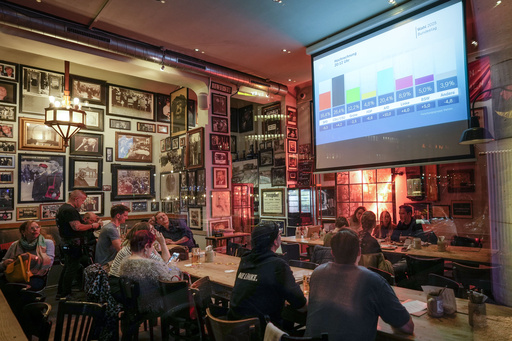BERLIN — In a national election held on Sunday, Friedrich Merz, the head of Germany’s conservative opposition, emerged with a somewhat unimpressive victory. Meanwhile, the far-right party, Alternative for Germany (AfD), saw its support double, marking its most significant performance since World War II, according to projections.
Chancellor Olaf Scholz acknowledged defeat for his center-left Social Democrats, describing the outcome as a “bitter election result.” Data from ARD and ZDF public broadcasters indicated that his party finished in third place, recording its worst result in postwar national elections.
Merz expressed aspirations to create a coalition government by Easter, although this task may pose substantial challenges.
The election, initially scheduled for a later date, was moved up by seven months after Scholz’s coalition fell apart in November during a term marked by internal discord. Voter sentiment reflected widespread dissatisfaction and a lack of enthusiasm for the candidates.
Concerns over the prolonged stagnation of Germany’s economy and calls for stricter immigration controls dominated the campaign, escalating tensions, particularly after Merz advocated for more stringent measures in recent weeks. The election backdrop included growing uncertainties regarding Ukraine’s future and Europe’s relationship with the United States.
As the most populous nation within the 27-member European Union and a significant NATO ally, Germany has been crucial in supplying arms to Ukraine, closely following the U.S. The country stands at the forefront of addressing emerging challenges in Europe, particularly in response to changing U.S. foreign and trade policies.
Current projections suggest Merz’s Union bloc received approximately 28.5% of the votes, while the anti-immigration AfD secured around 20.5%—twice its 2021 figures. Conversely, Scholz’s Social Democrats garnered just above 16%, a drop significantly lower than their previous postwar low of 20.5% in 2017. The only remaining coalition partner, the Greens, attained about 12% of the votes.
Among smaller parties, the far-left Left Party increased its representation to around 9%, while the pro-business Free Democrats, who were part of the previous coalition, appeared to be on the verge of losing their parliamentary seats with about 4.5%. Additionally, the Sahra Wagenknecht Alliance (BSW) was close to the pivotal 5% threshold necessary for a parliamentary presence.
The extent of Merz’s majority required to form a coalition will hinge on whether the BSW can secure representation in parliament. Merz remarked that “establishing a viable government in Germany as promptly as possible is crucial.” He acknowledged the significant responsibilities ahead and emphasized the need for immediate action rather than prolonged coalition negotiations.
Robert Habeck, the Vice Chancellor and Greens’ candidate for chancellor, advised Merz to moderate his approach following a heated campaign. He noted the general weakening of the political center, urging for introspection among party leaders on their contributions to this shift.
Despite the difficulties encountered by the Social Democrats in the election, their secretary, Matthias Miersch, maintained that their defeat wasn’t unexpected, emphasizing that it couldn’t be attributed solely to recent events.
The success of the AfD was noted by co-leader Tino Chrupalla, who claimed that “we have achieved something historic today,” indicating a shift towards the political center. The party’s previous high was 12.6% in 2017.
AfD’s candidate for chancellor, Alice Weidel, indicated openness to coalition talks with Merz’s party, asserting that policy changes cannot happen without collaboration. However, Merz has consistently refused to consider working with the AfD, reiterating this stance during a televised exchange post-election.
Weidel contended that the AfD would not need to concede much for a potential coalition, suggesting that Merz’s party had aligned closely with AfD policies. She warned that any alliance with left-wing parties would lead to instability, posing challenges for Merz’s government.
Merz rebutted the notion that voters were inclined towards a coalition with AfD, citing fundamental differences in policies concerning foreign relations, security, Europe, the euro, and NATO.
Chancellor Scholz condemned AfD’s electoral achievements, affirming that their rise must not be accepted under any circumstances.
In total, more than 59 million citizens in the country of 84 million were eligible to cast their votes for members of the Bundestag, the lower house of parliament, who will assemble under the glass dome of Berlin’s iconic Reichstag building.




